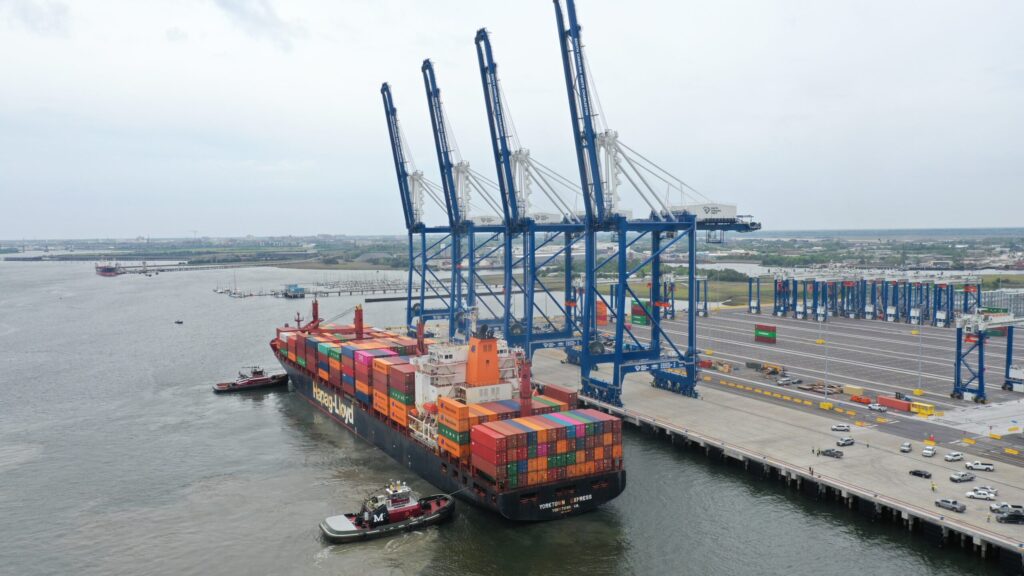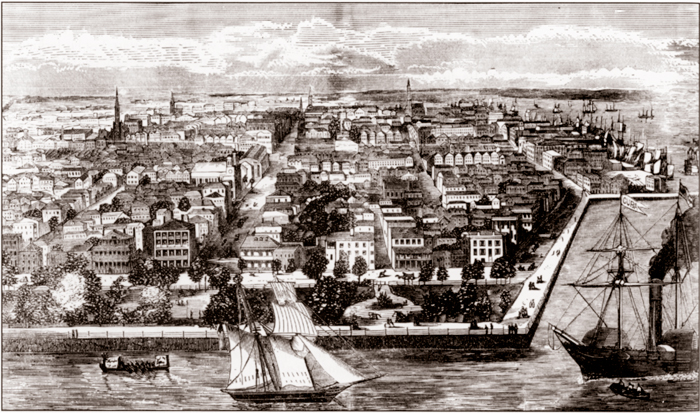How the fight over unions at the Charleston port affects all South Carolinians
When Gov. Henry McMaster announced that he is suing the International Longshoremen to prevent union labor from running the cranes at the new Leatherman Terminal in Charleston, his perennial assault on South Carolina workers reached a new and a dangerous low.

Since 2007, when work began to widen the Panama Canal to handle giant container ships, the state has approved spending $1 billion to deepen the Charleston harbor, build the new Leatherman terminal, and lay a rail-line to an inland port.
The Charleston port is one of the nation’s busiest, holding the U.S. record for exporting cars and tires, which are made here. It also ranks as one of the country’s most efficient terminals. With a $63 billion annual impact, the port plays a vital role in the state’s economy. According to the State Ports Authority, it creates or supports one in 10 jobs in South Carolina.
If the port is so critical and is operating so efficiently, why is the governor suing the ILA in federal court to void its contract with the shipping lines? It defies reason — unless you throw knee-jerk, anti-union politics into the mix.
A little history.
The longshoremen have run Charleston’s docks since 1869, with the founding of the Longshoremen’s Protective Union Association. In 1936, they joined the International Longshoremen’s Association as ILA Local 1422, now the largest Black union local in the country.

Today, the ILA is the backbone of Charleston’s Black middle class, with 1,000 active union members, 5,000 union retirees, and tens of thousands of family members whose lives for generations have been linked to the historic port.
The global shipping industry started using Master Contracts in 1957 to standardize the way ports worked globally. In 1977, the first contract for container shipments was negotiated. Finally, in 1995, the southern ports with “right to work” laws signed on, and every port from Maine to Texas agreed to the contractual relationship between the ILA and the US Maritime Alliance (USMX), which represents all the shippers and port operators.
Renewal of the Master Contact of 2022 requires all port terminals to keep ILA’s current jobs, and ports built after the 2016 contract must conform with the national practice of using ILA union labor to load and unload container ships. The only new port is the Leatherman Terminal in Charleston.
While all U.S. ports are owned by the state where they operate, only three ports use state employees to load and unload container ships and for other dock work, in Charleston, Savannah, and Wilmington, NC. The ILA has long done most of the work in these ports, but a hybrid mix of union and state workers is unique to these states. The port authorities elsewhere do not operate their ports; they contract out the dock work to professional organizations with an established relationship with the shipping lines — the ILA on the Atlantic and Gulf Coast and the International Longshore and Warehouse Union (ILWU).
These ports, and the politicians who control them, echo the old South’s anti-union, low-wage mantra as the way to recruit business. The maritime industry wants to standardize shipping operations and has committed to seeing new port terminals come in line with the rest of the ports in the United States and most of the world.
Gov. McMaster’s lawsuit argues that using the ILA to operate the cranes at the Leatherman Terminal would drive up the cost to the shippers and reduce the profit margin for the state-owned port. The governor considers the Master Contract a form of blackmail for forcing the new terminal to use union labor that will displace the lower-wage state employees. This will reduce the state ports’ cut of the per-container fee charged the shipper.
The National Labor Relations Board and the ILA have soundly rejected the governor’s argument because the ILA works for the shipping lines, not the state, and the governor can’t dictate who they do business with. Plus, South Carolina’s anti-union law prohibits the state from sabotaging labor contracts between consenting employers (shipping lines) and employees (longshoremen).
While the competitive advantage of prohibiting state workers from bargaining keeps wages down and the state’s profits up, using poorly paid state workers to compete with private business seems at odds with the Republican idea of limited government and free markets. Actually, the hybrid operation that the State Ports Authority is running is very much like the French government subsidizing Airbus and competing with Boeing. This seems a contradictory and unprincipled position for a staunchly capitalist governor and his appointed SPA board.
If the governor prevents the ILA from running the container cranes now run by state employees, the Master Contract prohibits the container ships from using the Leatherman Terminal. The container ships are not using the Leatherman docks now, and if the court overturns the National Labor Relations Board’s ruling, the Leatherman terminal won’t be used by the big ships for which it was built. Whatever the decision, the court’s ruling will be appealed to the U.S. Supreme Court and will result in at least another year of litigation.
It is also worth noting that the governor’s appointees who run the SPA gave over half of the more than $6 million in bonuses to their white-collar staff in 2021. Larger bonus checks than usual were from the additional container traffic due to the pandemic, which included a $336,875 bonus to past-president Jim Newsom, who left office with $1.1 million. Current president and CEO Barbra Melvin took home $615,333, which included her $18k country club dues and $11,000 car allowance. Eleven more executives with annual salaries topping a quarter-million received five-digit bonuses.
Since state agencies aren’t required to divulge salaries below $50,000, we can only guess how the remaining bonus money was shared with the SPA hourly wage earners. The Nerve, a publication of the conservative SC Policy Council, calculated the median bonus for wage workers was $2,555, much less than the executive staff’s $7,753 car allowance.
Let’s be clear. McMaster’s campaign to bust the ILA is just the latest example of this state’s strategy to recruit businesses and increase corporate profit by suppressing wages. During the 1980s, the state Department of Commerce paid to erect posters in northern airports with the slogan “SC Has No Labor Pains.” The posters featured a grinning, pregnant-looking man in a hardhat, a crude message to corporate interests that the Palmetto State’s business-friendly regulations will keep wages down and profits up.
The governor’s grandstanding against unions — on our dime, no less — is just the latest assault on working people. Twenty years ago, the SC legislature supported the first wave of pre-emptive laws to stop things that weren’t even happening. In 2002, South Carolina was one of five states with no minimum wage. We were the first to pass a law to prevent local governments from establishing a minimum wage above the federal minimum, which has been stuck at $7.25 since 2009. In 2012, the same national lobbyists, their S.C. counterparts, and the legislators they gave campaign donations pushed legislation through to prohibit local governments from requiring any employee benefits, such as sick leave, as a condition to get a business license.
Currently, 179 countries have laws requiring paid sick leave. The United States is not one of them. In 2017, McMaster signed a law that prohibits even unpaid sick leave or any other employee benefit as a requirement to do business in South Carolina.
During the worst phases of the pandemic, when the CDC and DHEC were advising the public to wear masks, the governor took his cues from the Hospitality and Retail Association rather than health professionals. He issued an executive order that allowed business owners to fire employees who wanted to mask up and made them ineligible for unemployment compensation they had earned. This most certainly endangered workers, and may have cost lives.
The governor and his well-organized, low-wage worshipping benefactors have long preyed on the unorganized workers of South Carolina. If they prevail in their quest to break one of the nation’s oldest and largest Black unions, the quality of life for workers here will be poorer, and the value of our lives further cheapened.
If the governor wins, we all lose.
